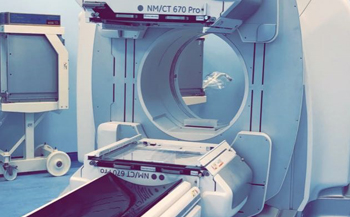
According to Taif Health Affairs, the introduction of nuclear medicine at King Faisal Medical Complex comes within the development process to boost performance and provide optimal services. The new service features medical screening and imaging using radioisotope. The radiation dose is administered either intravenously or orally. Hence, unlike ordinary radiology, the patient becomes the radioactive source and the device turn into the radiotracer. The radiopharmaceutical differs based on the patient's age and the organ to be screened. The radiopharmaceutical is used to image all human organs, through administering that material to the target organ only. For instance, to screen bones, another material is added to guide the radiopharmaceutical to the intended part only. The same applies to kidney, gallbladder, lungs... etc., where an organ-specific material is added to the radiopharmaceutical to administer it to the target organ only. External radiotracers (gamma camera) take a picture of the distribution of the radiopharmaceutical in the body, unlike other conventional imaging techniques where the target organs are imaged by an external ray.
“The nuclear medicine provides an outstanding service, which will - by Allah's Leave - help improve patients' overall screening; thus, leading to accurate diagnostics of various diseases that necessitate such examinations.”, adds Taif Affairs.
It is noted that last week several health projects were launched in Taif, which are valued at over half a billion SR, which will help - by Allah's Leave - increase capacity by 20%. These projects feature a maternity and children tower (280m SR) with 300-bed capacity, where 120 beds are allocated for incubators and ICU, cutting-edge medical appliance, an 8-beds integrated emergency department, 8 operating rooms and 19 specialized clinics. The hospital also includes a residential building for nurses to accommodate 1,300 nurses, in addition to an integrated entertainment club enhanced with needed services (valued at 71m SR).
Furthermore, the projects include a Nuclear Medicine Unit at King Faisal Medical Complex (13m SR). Umm Al-Dawam General Hospital will be launched with 50-bed capacity (52m SR), in several specialties, including internal medicine, dermatology, urology, ophthalmology, ENT, surgery, pediatrics, and mental health. Also, the hospital features cutting-edge emergency department, operating rooms, radiology and labs. In the same vein, the first stage of Al-Mahani Hospital is inaugurated with 50-bed capacity. Full operation will be stage-wise by Allah's Leave, where the first stage covers outpatient clinics (surgery, pediatrics, orthopedics, ophthalmology, internal medicine, dermatology, urology, ENT and mental health. Other stages will follow suit.
These projects also include 3 specialized units at King Abdulaziz Specialist Hospital (18m SR), due to the key role of certain medical specialties, and their contribution to integrated health services in Taif, to reduce referring medical cases to hospitals outside. Atop of these units comes the oncology unit, which helps diagnose and treat over 85% of various tumor cases. Its also helps administer chemotherapy. The division features the state-of-the-art medical standards, appliances and professionals. It also features a cardiac cath unit with three different subdivisions, namely: cath, diagnosis and thoracic pains treatment. It will help speed up diagnosis, early detection of clots and catheterization.